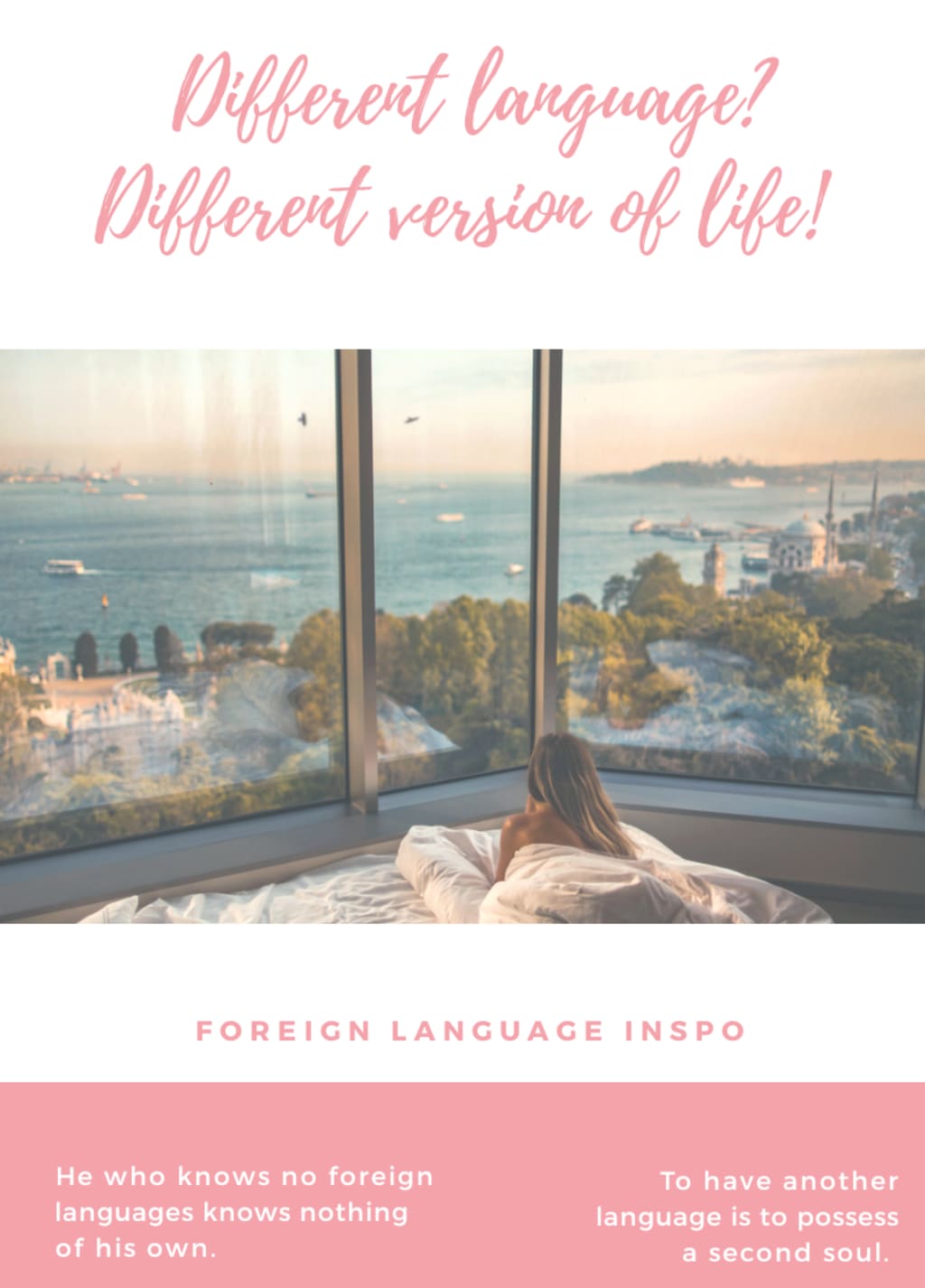11 BEST AND INSPIRATIONAL ARTICLES ABOUT LEARNING LANGUAGES I FOUND ONLINE
Language is not a genetic gift, it is a social gift. Learning a new language is becoming a member of the club – the community of speakers of that language

“Language is not a genetic gift, it is a social gift. Learning a new language is becoming a member of the club – the community of speakers of that language”- Frank Smith.
Now, I do not know who Frank Smith is, but when I found this quote online I truly integrated that. I recently joined a community of foreign language speakers on social media, mostly on Instagram and if before this decision, everything in my feed was more related to fashion, beauty and beautiful pictures, it’s now pretty much language and learning foreign languages content. It is more motivational than I really thought it would be and more fun than I expected it to be. Although I cannot possibly check all new posts, I feel really impressed and pleasantly surprised to report back that social media can make you feel inspired to do stuff than just make you drool on the pictures you see, leaving you feel like you are not accomplishing anything worthwhile in this life.
Then I found this one:
“The more languages you know, the more you are human” from another person I have no idea who he is, named Tomas Garrigue Masaryk. (note to self – to look those names up)
So these 2 quotes inspired me to search for more content on language learning to get insights, tips, tricks and share them here, but first, apply them myself. Here are some of the most inspirational and educational posts I found online on language learning to motivate you in your actions of foreign language learning.
1.I would like to begin with one short article that discusses some findings regarding how the brain learns a new word. And I quote:
PRACTISING LANGUAGE IS IMPORTANT. EVERY LITTLE HELPS. JUST PERCEPTION – LISTENING – IS HELPFUL.
This suggests that even listening to a podcast such as CoffeeBreak on Spotify or similar ones, will help tremendously in you picking up the language faster. I can relate to this because while growing up I used to watch a lot of Spanish soap operas and when I started really learning Spanish in school, I was able not only to learn it faster but to also have this in the flow perception when learning anything new. It was not something I dreaded, even if it had to do with grammar because I simply loved the language. I was accustomed to it and it was easy to make my learning and language skills progress way faster.
THE RESEARCHER … THOUGHT REPETITION IS THE KEY – BUT THE BRAIN LEARNED BEST WHEN IT WAS RELAXED AND NOT TRYING TO REMEMBER ANYTHING AT ALL. {…} YOU REMEMBER BECAUSE YOU GO BACK TO IT AGAIN AND AGAIN. {…} THE BRAIN HAS TO DETERMINE WHAT IT IS IMPORTANT AND WHAT’S NOT.
This really supports what I was mentioning above with the state of flow I was finding myself whenever I was having my Spanish classes, whenever I was learning on my own or watching something in Spanish. This means if you want to learn a language, you must do it because you really want to learn that target language, not because it is something someone is telling you to do, not because you imposed on yourself to learn a new language or a specific language. You must have a connection with the foreign language you choose to learn. That’s when passion blends with learning and if your attitude towards learning is relaxed, you are more likely to quickly become fluent.
Read more in this article.
2.This article was written by Amy Thompson who is an associate professor of Applied Linguistics at University of South Florida and she studies how learning languages can have cognitive and emotional benefits. 2 key concepts are discussed here: cultural competence and tolerance of ambiguity.
Cultural competence is opening people’s eyes to a way of doing things that's different to their owns. Tolerance of ambiguity refers to the comfort level a person experiences when dealing with unfamiliar situations.
Analysing cultural stereotypes when learning a new language means also learning a new way of thinking and behaving, much like in this quote:
“Learning a foreign language not only reveals how other societies think and feel, what they have experienced and value, and how they express themselves, it also provides a cultural mirror in which we can, more clearly, see our own society.” Chancellor Edward Lee Gorsuch.
This Chinese proverb says it all:
“To learn a new language is to have one more window from which to look at the world.”
The second part of the post deals with the tolerance of ambiguity concept which the author pinpoints as follows:
SOMEONE WITH A HIGH TOLERANCE OF AMBIGUITY FINDS UNFAMILIAR SITUATIONS RATHER EXCITING THAN FRIGHTENING. {…} CONVERSATIONS IN A FOREIGN LANGUAGE WILL INEVITABLY INVOLVE UNKNOWN WORDS. {…} THOSE WITH A HIGH TOLERANCE OF AMBIGUITY WOULD FEEL COMFORTABLE MAINTAINING THE CONVERSATION DESPITE THE UNFAMILIAR WORDS INVOLVED.
To read the full article pop on here.
3.Can learning a new language boost your creativity? So, nowadays we see a lot of content, books and highlight put on creativity because as Einstein says it “creativity is intelligence having fun” and it’s more important to be creative than smart, or something along those lines. Learning something new requires our brains to adapt quickly and grab every method out there to get to the outcome desired. This goes the same way with language learning. It has been researched and the result is that learning a foreign language expands our divergent thinking. The author explains this:
AT A VERY BASIC LEVEL, LEARNING A FOREIGN LANGUAGE REQUIRES US TO CONSTRUCT AND NEGOTIATE THE UNIQUE ARCHITECTURE IN WHICH IT CONSISTS. EACH NEW LANGUAGE WE LEARN PRESENTS US WITH NEW BARRIERS WHEN TRYING TO CONVEY MEANING. {…} AS YOUR MIND GENERATES POSSIBILITIES IN ORDER TO NEGOTIATE THESE BARRIERS, IT ENGAGES IN A POTENT FORM OF DIVERGENT THINKING – THE VERY THINKING THAT DRIVES CREATIVITY.
Of course the method you use to learn the language can interfere in this enhancement of creative power and classic teaching focusing on memorising grammar structures and the focus on giving always the “correct answer” to problem solving is not going to achieve that outcome. The author is quoting Sir Ken Robinson as he is arguing the fact that the educational system has become so obsessed with avoiding mistakes that because of that “we are educating people out of their creative capabilities”.
More of your creativity related questions with regards to learning a foreign language are answered by the author in this blog post.
4.Things bilingual people do. This explores a different version of how bilinguals experience the world around them. It is as funny as it is based on science and research and it’s just something different to read to give you a little bit of inspiration. Marta Krzeminska, language passionate at LinguaLift blog writes about all things connected to language learning and learners. Have a go here.
5.From the same author I would like to also include a little info-graphic which should give you the push to include a little bit of language learning in your daily schedule. I was checking that out because I wanted to see how is the world, if you can say that, taking into account it’s just around 200 people the study was conducted on, incorporates foreign language study in their busy schedules. I am someone that prefers to embrace language learning throughout the day, for few minutes, for pleasure and not as a form of “I must learn this, it’s on my TO DO LIST.” That never worked for me. I have to find it fun and easy and relaxing. More insightful info to look at in the link Language Learning Habits.

6.Are language learning apps really that effective? I was actually asking this myself because the theory you have in mind is that you need a teacher, a classroom and a schedule and constant memorising. It’s not fun, maybe that’s why I postponed so much initiating a new foreign language learning. So, I have discovered a different approach mainly after watching this Youtube video, and then discovered some other polyglot Youtubers who kept mentioning about all these free apps which you can use to learn a language. My first thought was that it’s not sustainable. You need structure, grammar and a clear direction on what you are studying and how you are going to fulfil the learning material to make sure there is results soon and visible. An app would only and can only teach you so much as to words, vocabulary and help you memorise it better or faster.
The article explores in my opinion the history of language learning, starting from audiolingualism, getting to the communicative approach and ending with the foreign language learning apps. The authors, all working at the University of Bath as course leaders are Mike Groves, Diana Hopkins and Tom Reid and I could not agree more with their findings related to the fact that the language learning apps can only work as an useful supplement when learning a new language but it is also a great tool to help literacy where that is not possible and give the option to everyone through free apps to learn a language and be able to articulate basics in a foreign language. In my own experience, learning a few minutes every day through the app is making me curious and excited for the next learning experience because I see progress straight away. And that’s because it’s few words. But if you consider the theory by which if you set yourself a goal and you dedicate 1 minute per day to that goal every day, simply because you learn fast and remember for the next day, makes you feel satisfied with yourself and keeps you going. It keeps you motivated and sooner than you realise you will extend the time from 1 minute to 5, and so on, until it truly becomes a habit and a passion, something that you enjoy doing rather than something you dread starting. So, in my opinion language learning apps are amazing, they are of course just a supplement as you could never really become advanced just by using an app, but most likely it helps shape the patterns to learning and it is motivating you towards bigger goals.
More reading on the subject of audiolingualism (the drill where students repeat sentences over and over until they memorise it and recognise it in practice), the communicative approach (which relates to: it’s better to speak broken grammar and good pronunciation than perfect grammar but wrong pronunciation, as in that situation you cannot make yourself understood) and the audio-lingual drilling can be found here. The apps I use for language learning are Drops and LingQ.
7.The mind of the language learner written by Steven Kaufmann (who created also the LingQ app for language learning), the linguist that can speak 17 languages explores in this article how the mind of the reader can be associated with the mind of the language learner by seeing yourself as someone that can learn, that enjoys learning and that is positive about the learning/reading.
8.Storytelling to learn languages. This is written by Luca Lampariello and he is a well known figure in the kingdom of polyglots and his insights and language learning observations are probably where most of the new arrived on the market polyglots get their information or learning tips they share online too. He is explaining in this article that stories help us memorise vocabulary and so “It’s not a coincidence that one of the most popular techniques among memory experts is to build a story around what they want to remember.” as he writes. I mean, storytelling does everything that we need to acquire the language: stories are fun, full of vocabulary that has context for the new words, stories teach us how to speak the way the foreigner of that target language expresses himself or herself, configuring the grammar in a cultural immersion and linguistic environment. I also loved this article because Steve Kaufmann’s app LingQ is based on stories and reading and hearing the stories there helps a lot with pronunciation, spelling and both visualisation of the words in context.
I am leaving for the end the best of the articles I found online about language learning and one of them is about the importance of the digital language divide.
9.How does the language you speak shape your experience of the internet? written by Holly Young. This is probably one of the most interesting and inspirational piece of content relating to language learning and foreign languages online. I found reading it like a breath of fresh air in the large ocean of alike foreign language posts and articles found on the internet. It makes you think, it makes you wonder and it makes you want to do something about it. If you are like me, and you do speak a language that is only based in that specific country, you do want to preserve it, you do feel it is important that we keep the culture and not globalise everything because the official language online is English (thus highlighting more English learning than our own culture and native languages, simply because that’s the universal language now). The article explores how countries in which English or any other foreign language learning is a priority puts that city/town/maybe even country to being excluded from information as all information online is in English. Lacking English language skills makes one vulnerable to outdated information and inability to find new information in one’s native language due to lack of translation because everyone assumes that everyone knows or should know English. Here’s my highlights:
INEQUALITIES IN THE INFORMATION AVAILABLE FOR DIFFERENT LANGUAGES ONLINE HAS IMPLICATIONS FOR WHO AND WHAT GETS REPRESENTED – AND BY WHOM. {RESEARCH BASED ON WORD SEARCHES RELATED TO THE LANGUAGE SPOKEN PINPOINTS THAT 11% OF PEOPLE ARE MULTILINGUAL ON TWITTER AND 15% ON WIKIPEDIA} MULTILINGUALS HAVE THE POWER TO BE INFLUENTIAL WHETHER IT IS TRANSLATING AND BRINGING FOREIGN CONCEPTS INTO DIFFERENT LANGUAGE EDITIONS ON WIKIPEDIA, OR MOVING BREAKING LOCAL NEWS STORIES TO NEW LANGUAGE COMMUNITIES AND DIFFERENT GEOGRAPHIES.
TWITTER HAS A PARTICULARLY HIGH NUMBER OF MALAY, PORTUGUESE AND SPANISH USERS ALSO TWEETING IN ENGLISH.
THE RESEARCH OF ANDRAS KORNAI AT THE PAPER DIGITAL LANGUAGE DEATH CLAIMS TO PRESENT EVIDENCE OF A MASSIVE DIE – OFF CAUSED BY THE DIGITAL DIVIDE. WILL THE INTERNET ACT AS A CATALYST FOR THE EXTINCTION OF MANY OF THE WORLD’S LANGUAGES?
ACCESS TO INTERNET ALSO OFFERS THE OPPORTUNITY FOR LINGUISTIC EMPOWERMENT : TO DOCUMENT AND PRESERVE LANGUAGES, TO SHARE TEACHING ONLINE TO ENCOURAGE NEW SPEAKERS, TO TRANSLATE IMPORTANT INFORMATION FOR MARGINALISED GROUPS AND TO EVEN CREATE VIRTUAL COMMUNITIES OF SPEAKERS WHERE THEY MAY STRUGGLE TO EXIST OFFLINE.
{THE ENDANGERED LANGUAGES PROJECT} IS THERE A DANGER HOWEVER THAT INSTEAD, NEW USERS, INFLUENCED BY THE VOLUME OF CONTENT IN MORE DOMINANT LANGUAGES, WILL ABANDON THEIR MOTHER TONGUES ONLINE?
RESEARCH SUGGESTS THAT SPEAKERS OF SMALLER LANGUAGES ONLINE WILL OFTEN OPT TO USE THE INTERNET IN A LARGER LANGUAGE, EVEN IF THEY DON’T SPEAK IT WELL.
10.The only post you’ll ever need to learn a language in record time by Tim Ferris. I am not even going to dive into this one. This is what you will learn from reading it:
How to speak your target language today.
How to reach fluency and exceed it within a few months.
How to pass yourself off as a native speaker. And finally, how to tackle multiple languages to become a “polyglot”—all within a few years, perhaps as little as 1-2.
11.And finally, the last inspirational resource I discovered online about foreign language learning is contained in a series of articles written by Kevin Morehouse, named Language News from Around the World. As the title suggests, it’s like a newsletter with everything fresh. The blog has not been updated in a while but still, scrolling through older versions, I could still find great language learning content and more news around foreign languages.
To end, I will include some inspirational quotes that I really find motivating to help you initiate this foreign language learning habit. I trust it will be of use to you!
“Language reflects the soul of the people.” Paul Schibler
“The spirit of a language is most clearly expressed in its untranslatable words.” Baroness Marie ‘Freifrau’ von Ebner-Eschenbach
“With each language, you learn to free yourself from your trapped spirit.” Friedrich Ruckert
“With foreign words on our tongue comes also the foreign spirit into our world.” Carl Theodor Korner

About the Creator
Annaelle Artsy
Me, myself & I
Slow living in the reading






Comments
There are no comments for this story
Be the first to respond and start the conversation.